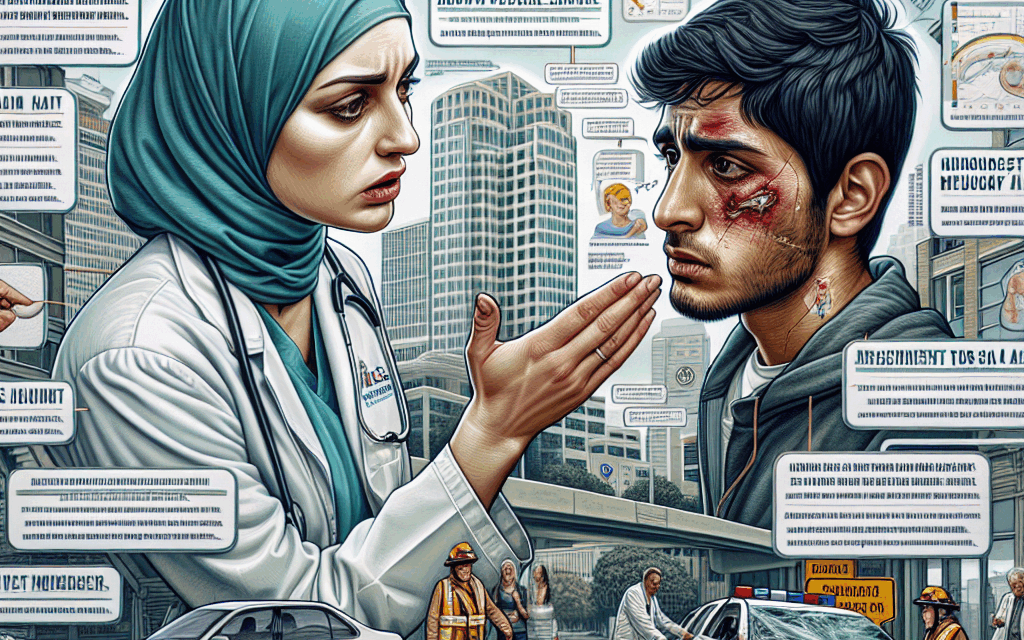Why Seeking Medical Care After an Accident in San Jose is Crucial
Accidents can happen at any time and in any place, and San Jose is no exception. Whether it’s a car crash, a slip and fall, or a workplace incident, the aftermath can be overwhelming. One of the most critical steps to take after an accident is to seek medical care. This article explores the importance of medical attention post-accident, focusing on five key areas: understanding injuries, legal implications, insurance considerations, emotional health, and long-term recovery. Each section will provide valuable insights and practical advice for those navigating the aftermath of an accident in San Jose.
Understanding Injuries: The Hidden Dangers
After an accident, many individuals may feel fine or believe their injuries are minor. However, some injuries may not manifest symptoms immediately. Understanding the types of injuries that can occur and the importance of medical evaluation is crucial.
- Types of Injuries: Common injuries from accidents include concussions, whiplash, fractures, and soft tissue injuries. Each of these can have long-term effects if not treated properly.
- Delayed Symptoms: Conditions like internal bleeding or traumatic brain injuries may not show symptoms right away. A medical professional can conduct the necessary tests to identify these hidden dangers.
- Comprehensive Evaluation: Seeking medical care ensures a thorough evaluation, which may include imaging tests like X-rays or MRIs to assess the extent of injuries.
For instance, a study published in the Journal of Trauma found that nearly 30% of individuals involved in car accidents experienced delayed symptoms of injury. This underscores the importance of not dismissing the need for medical care simply because one feels fine immediately after an accident.
Moreover, certain injuries, such as whiplash, can lead to chronic pain and mobility issues if not treated promptly. A healthcare provider can recommend appropriate treatment plans, including physical therapy, medication, or even surgery in severe cases. Ignoring these injuries can lead to long-term complications that could have been avoided with early intervention.
Legal Implications: Protecting Your Rights
In the aftermath of an accident, understanding the legal implications is vital. Seeking medical care not only aids in recovery but also plays a significant role in any potential legal proceedings.
- Documentation of Injuries: Medical records serve as crucial evidence in legal cases. They provide a timeline of injuries and treatments, which can be essential in proving liability.
- Establishing Negligence: In personal injury cases, demonstrating that the other party was negligent is key. Medical documentation can help establish the extent of injuries and their impact on your life.
- Insurance Claims: Insurance companies often require medical records to process claims. Having a comprehensive medical evaluation can expedite this process and ensure you receive the compensation you deserve.
For example, in a case where a pedestrian is struck by a vehicle, the medical records detailing the injuries sustained can be pivotal in establishing the driver’s negligence. If the pedestrian fails to seek medical attention, it may weaken their case, as the insurance company could argue that the injuries were not severe or even fabricated.
Additionally, California operates under a comparative negligence system, meaning that if you are partially at fault for the accident, your compensation may be reduced. Having thorough medical documentation can help clarify the extent of your injuries and the impact they have on your life, which is crucial in negotiations with insurance companies or during court proceedings.
Insurance Considerations: Navigating the Claims Process
Understanding how insurance works after an accident is essential for ensuring you receive the necessary care and compensation. Medical care plays a significant role in this process.
- Immediate Care and Coverage: Most health insurance plans cover emergency medical care. Seeking immediate treatment can help you avoid out-of-pocket expenses.
- Claiming Medical Expenses: Documenting all medical visits, treatments, and expenses is crucial for filing claims with your insurance provider.
- Negotiating Settlements: Insurance companies often use medical records to determine settlement amounts. Comprehensive documentation can lead to higher compensation.
In San Jose, many residents rely on their health insurance to cover medical expenses after an accident. However, understanding the nuances of your policy is essential. For instance, some plans may require pre-authorization for certain treatments, while others may have specific networks of providers. Failing to follow these guidelines can result in denied claims.
Moreover, if you are involved in an accident with an uninsured or underinsured motorist, having a robust medical record can help you pursue compensation through your own insurance policy. California law mandates that drivers carry uninsured motorist coverage, which can be a lifeline in such situations.
In a case study involving a San Jose resident who was injured in a motorcycle accident, the individual was able to secure a settlement of $150,000 due to comprehensive medical documentation that illustrated the severity of their injuries and the impact on their daily life. This highlights the importance of seeking medical care and maintaining thorough records.
Emotional Health: The Psychological Impact of Accidents
Accidents can have a profound psychological impact on individuals, often leading to conditions such as PTSD, anxiety, and depression. Seeking medical care is not only about physical injuries; it’s also about addressing emotional health.
- Recognizing Emotional Trauma: Many individuals underestimate the psychological effects of an accident. Professional evaluation can help identify these issues early.
- Accessing Mental Health Resources: Medical professionals can refer patients to mental health specialists who can provide therapy and support.
- Long-term Mental Health Care: Ongoing psychological support may be necessary for some individuals, and early intervention can lead to better outcomes.
Research indicates that nearly 30% of individuals involved in traumatic accidents experience some form of psychological distress. In San Jose, mental health resources are available, but many individuals may not seek help due to stigma or lack of awareness. A healthcare provider can help bridge this gap by recommending appropriate mental health services.
For example, a case study involving a woman who experienced a severe car accident revealed that she developed PTSD symptoms, including flashbacks and anxiety. After seeking medical care, she was referred to a therapist specializing in trauma, which significantly improved her quality of life. This illustrates the importance of addressing emotional health alongside physical recovery.
Long-term Recovery: Ensuring a Full Return to Health
Long-term recovery after an accident often requires ongoing medical care and rehabilitation. Understanding the importance of this process can help individuals regain their health and quality of life.
- Rehabilitation Services: Many injuries require physical therapy or rehabilitation services to regain strength and mobility. Early intervention can lead to better recovery outcomes.
- Follow-up Care: Regular follow-up appointments with healthcare providers are essential to monitor recovery progress and adjust treatment plans as needed.
- Preventing Future Injuries: Medical professionals can provide guidance on lifestyle changes and preventive measures to avoid future accidents or injuries.
In San Jose, various rehabilitation services are available, including physical therapy, occupational therapy, and pain management clinics. Engaging in these services can significantly enhance recovery and help individuals return to their daily activities more quickly.
For instance, a case study of a construction worker who suffered a back injury highlighted the importance of rehabilitation. After undergoing a structured physical therapy program, he was able to return to work within six months, compared to the year it would have taken without intervention. This emphasizes the need for timely medical care and rehabilitation services in the recovery process.
Conclusion: The Importance of Seeking Medical Care After an Accident
In conclusion, seeking medical care after an accident in San Jose is crucial for several reasons. Understanding the potential for hidden injuries, navigating legal implications, managing insurance claims, addressing emotional health, and ensuring long-term recovery are all vital components of the post-accident process. By prioritizing medical care, individuals can protect their health, rights, and well-being.
Accidents can be life-altering, but with the right medical attention and support, individuals can navigate the challenges that arise and work towards a full recovery. Whether it’s a minor incident or a severe accident, never underestimate the importance of seeking medical care. It’s not just about immediate treatment; it’s about ensuring a healthier future.





